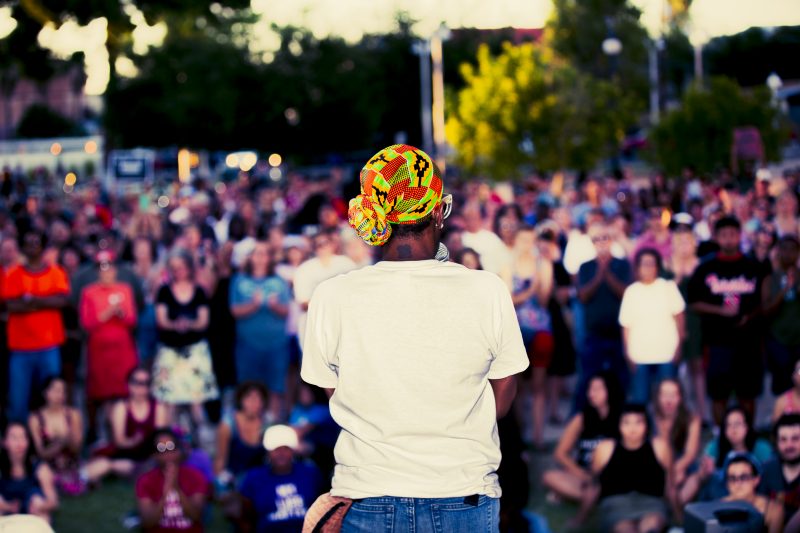Set Up a Film Screening for Black Future Month 2017
This February, we are celebrating Black Future Month — a new way to look at the idea of Black History Month. As diversity educator Shakti Butler says, “We acknowledge that history is an ever-present component of the system of inequity that African Americans and all people of color face. Black Future Month is about honoring history while moving towards true racial justice in our lifetime.”
MEF offers a number of films designed explicitly to help students think critically about race in America. From filmmaker Daphne Valerius’s exploration of how media images of beauty affect the self-esteem of African-American women, to Byron Hurt’s intimate exploration of what it’s like to grow up as a black man in America, to Tim Wise’s look at what it’s like to grow up with the benefits of white privilege, these films speak directly to the present moment.
We encourage you to use these films in your classes, organize programming on your campus, or host screenings in your community. To help you do that, we’re offering a special 25% discount on select films now through the end of February.
SOUL FOOD JUNKIES
A Film About Family, Food & Tradition
Award-winning filmmaker Byron Hurt’s exploration of the soul food tradition, its relevance to black cultural identity, and its continuing popularity despite known health concerns. Features soul food cooks, historians, doctors, and food justice movement activists who are challenging the food industry, creating sustainable gardens, and advocating for healthier takes on soul food.
THE SOULS OF BLACK GIRLS
Filmmaker Daphne Valerius’s award-winning documentary explores how media images of beauty undercut the self-esteem of African-American women. Valerius surveys the dominant white, light-skinned, and thin ideals of beauty that circulate in the culture, and talks with African-American girls and women about how these images affect the way they see themselves.
I AM A MAN
Black Masculinity in America
Award-winning filmmaker Byron Hurt explores what it means to be a black man in America. Hurt gathers reflections on black masculinity from men and women of a variety of socioeconomic backgrounds. Also features bell hooks, Michael Eric Dyson, John Henrick Clarke, Dr. Alvin Poussaint, MC Hammer, Jackson Katz, and many others.
HIP-HOP
Beyond Beats & Rhymes
Director Byron Hurt conceived the documentary as a “loving critique” of a number of disturbing trends in the world of rap music. He pays tribute to hip-hop while challenging the rap music industry to take responsibility for glamorizing destructive, deeply conservative stereotypes of manhood.
NOT JUST A GAME
Power, Politics & American Sports
In a direct rebuke to those who argue that sports and politics don’t mix, Not Just a Game explores how U.S. sports culture has glamorized militarism, sexism, racism, and homophobia while also serving as a spectacular site of political resistance to these same regressive forces at key moments throughout history.
BELL HOOKS
Cultural Criticism & Transformation
bell hooks, one of America’s most accessible public intellectuals, makes a compelling argument for the transformative power of cultural criticism. hooks discusses the theoretical foundations and positions that inform her work and demonstrates the value of cultural studies in concrete analysis. In this two-part video, extensively illustrated with many of the images under analysis,
THE LAST INTERVIEW
Stuart Hall on the Politics of Cultural Studies
In this interview conducted shortly before his death in 2014, Stuart Hall, one of the seminal figures in cultural studies, talks about the always shifting terrain of race and identity in the United States and Britain, offering fascinating cultural and political insights into the presidency of Barack Obama and the 2012 Olympics in London.
RACE, THE FLOATING SIGNIFIER
Featuring Stuart Hall
Stuart Hall explores how variations in people’s appearances come to be mistaken for essential differences. He then traces how these misinterpretations function both to express and to reproduce dominant power relations. An ideal introduction to how cultural studies intervenes in debates about race, representation, identity, and power.
REPRESENTATION & THE MEDIA
Featuring Stuart Hall
Cultural theorist Stuart Hall offers an extended meditation on representation. Hall’s concern throughout is the centrality of culture to the shaping of our collective perceptions, and how the dynamics of media representation reproduce forms of symbolic power.
FRAMING AN EXECUTION
The Media & Mumia Abu-Jamal
Examines media coverage of the controversial case of Mumia Abu-Jamal, a journalist serving a life sentence in prison for the fatal shooting of a police officer. Focusing primarily on an influential ABC 20/20 news report, the film raises series questions about journalistic balance and fairness that resonate far beyond this particular case.
RACE, POWER & AMERICAN SPORTS
Featuring Dave Zirin
Cultural historian Dave Zirin examines the myriad ways sports culture has worked both to reproduce and challenge the wider culture’s dominant ideas about race. Zirin’s analysis shows how athletes of color have posed a direct threat to traditional notions of whiteness, white male authority, and American ideals of masculinity.
WHITE LIKE ME
Race, Racism & White Privilege in America
Based on the work of bestselling author Tim Wise, this film offers a riveting look at white anxieties, racial backlash, and continuing racial inequality despite claims that we’ve entered a post-racial, colorblind society.
TIM WISE: ON WHITE PRIVILEGE
Racism, White Denial & the Costs of Inequality
In this spellbinding lecture, anti-racism educator Tim Wise offers a vivid and accessible introduction to the social construction of racial identities, and a critical new educational tool for exploring the often invoked, but seldom explained, concept of white privilege.
HOW RACISM HARMS WHITE AMERICANS
With John H. Bracey Jr.
Distinguished historian John H. Bracey Jr. offers a provocative analysis of the devastating economic, political, and social effects of racism on white Americans. Bracey’s central point is that failing to acknowledge the centrality of race, and racism, to the American project not only minimizes the suffering of black people, but also blinds us to how white people have been harmed as well.


